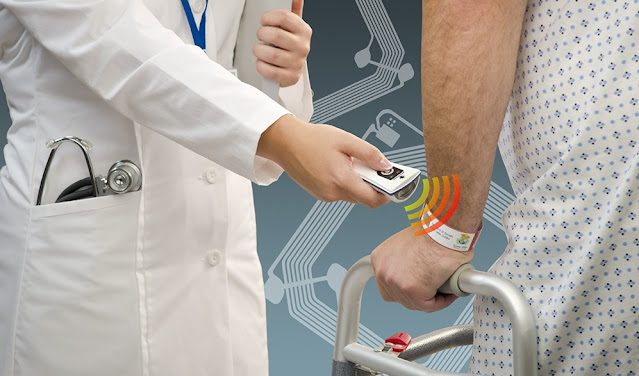RFID in Healthcare Aids Hospitals in Keeping Track of Patients
Radio Frequency Identification is referred to as RFID. This technology uses a tag system to operate. On a product, a particular tag is linked, and radio waves can locate that tag. The three components of radio frequency identification are the antenna, reader, and transponder. A radio-frequency signal is carried by the antenna, enabling communication with the RFID tag. The RFID tag detects the activation impulse as it leaves the monitoring antenna's frequency field and stores the data that was selected by the antenna. RFID uses the same technology as barcodes do. In any case, the primary difference is how quickly RFID operates in compared to a barcode reader. The other transformation is that in order to trace data from a good or commodity, one must scan it with a barcode scanner, while radio Frequency Identification tracks the product's data using radio waves. RFID can be used in the healthcare sector in a variety of ways.
The global RFID in Healthcare Market was valued at US$ 4,004.0 Mn in 2019 and is forecast to reach a value of US$ 16,756.6 Mn by 2027 at a CAGR of 19.6% between 2020 and 2027.
An individual's wrist is fitted with an RFID band. The hospital retains a record of the patient's tracing thanks to RFID. The wristband contains all necessary information, like name, medical history, allergies, and others. RFID can help the doctor determine whether a patient is allergic to any medications when they have been hospitalised for a long time. The individual's past performance is also helpful because it provides insightful information. The RFID in healthcare is extremely portable. For instance, if a person struggles with memory, they might stray or become lost in a hospital. The medical field can see the precise patient information through RFID wristbands. For healthcare to function, equipment, devices, and automotive tracing are required. It does not just create they are aware of where their vehicles, devices, and other items are. However, asset upkeep is also permitted.
Healthcare equipment is crucial and must constantly be in a ready-to-use state. Assets can be tracked using RFID tags whether they are moving inside or outside of a healthcare facility. When it pertains to the Operation Theatres, it is mandatory to perform an initial asset inspection in order to prevent unintended breakdowns. Such mission-critical asset management is greatly facilitated by asset maintenance management software. The domain of pharmaceuticals in hospitals can be managed via asset tracking and management software. The system provides information on drug expiration dates and stock levels. Overall, the app also makes it simple to keep track of your present medicine supply.



.jpg)
Comments
Post a Comment